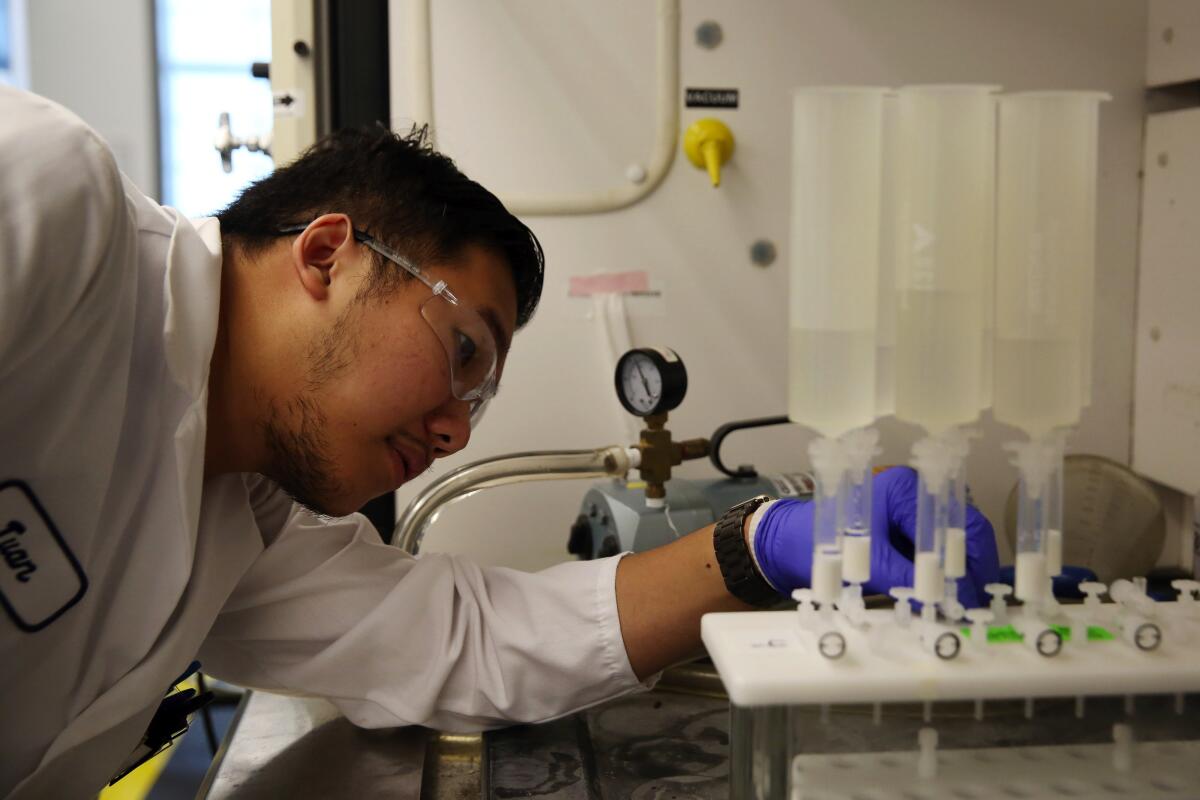Commentary: PFAS are ‘forever’ chemicals contaminating our water sources and affecting our health

- Share via
The National Academies of Sciences, Engineering and Medicine recently released its nearly 300-page Guide on PFAS Exposure, Testing and Clinical Follow-up. After more than 15 years of experience studying PFAS chemicals in our drinking water and their health effects, I believe that action is long overdue to minimize the serious health effects of these toxic chemicals.
PFAS, also known as per- and polyfluoroalkyl substances, are largely unregulated man-made chemicals that have been used widely since the 1950s to manufacture and/or to improve various types of everyday products such as nonstick cookware, stain-resistant clothing and carpets, and food packaging. Everyone has been exposed to these “forever” chemicals by consuming PFAS-contaminated food or by using products made with PFAS, but scientific studies show that PFAS exposures can cause decreased vaccine response, testicular cancer, kidney cancer, ulcerative colitis, thyroid disease, high cholesterol, hypertension during pregnancy and other health conditions.
Another source of PFAS exposure for some communities is contaminated drinking water. PFAS have been detected in many water supplies around the world, including right here in Orange County. The Orange County Groundwater Basin provides 77% of the water supply to north and central Orange County and has tested positive for a variety of PFAS chemicals that likely originated from wastewater treatment facilities upstream on the Santa Ana River. While I applaud the work that the state of California, Orange County Water District and our local water providers are doing to reduce PFAS exposures, including restricting PFAS in food packaging and cookware sold in California after 2023, requiring manufacturers to consider PFAS alternatives for stain-resistant treatments of carpets, upholstery, clothing and shoes, more closely monitoring common PFAS chemicals in our water supplies, shutting down affected wells, using alternative water sources and building new or enhanced water treatment systems, we should do much more.
Although reducing current and future exposure is important, some of the most notorious PFAS chemicals accumulate in the body and remain there for years or even decades after exposure, and these PFAS have been shown to cause serious health problems. In its report, the National Academies recommends offering PFAS blood testing to people with a history of elevated exposure to PFAS, for example from drinking water containing PFAS chemicals, and that doctors should consider those blood test results and past exposures when providing patient care. This is a good start to what, I believe, needs to be a much stronger strategy to address this public health hazard.
Orange County residents can take their own action by requesting information about PFAS levels in their own water through their water provider’s mandated annual water quality report, also known as a consumer confidence report, which is often available online. If PFAS chemicals are detected in their water, they can reduce their exposure to PFAS by installing home water filters that are approved for PFAS removal. UCI is currently part of a national multisite study on PFAS, designed to help scientists better understand the health of effects of PFAS exposure. Some residents of Anaheim, Orange, Yorba Linda and Garden Grove, areas that are close to the Santa Ana River recharge basins for our groundwater supply, are participating and have had their blood tested for PFAS chemicals, as well as for cholesterol, thyroid function and other health markers, at no cost.
We can take action to reduce our exposures to these chemicals, learn more about their health effects and ensure that people with elevated exposures get the appropriate medical care. Learn more about the UCI PFAS Health Study by visiting the website at https://sites.uci.edu/pfas/.
Scott Bartell is a professor of environmental and occupational health with the Program in Public Health at the University of California, Irvine, and is the lead investigator for the UCI PFAS Health Study.
All the latest on Orange County from Orange County.
Get our free TimesOC newsletter.
You may occasionally receive promotional content from the Daily Pilot.



